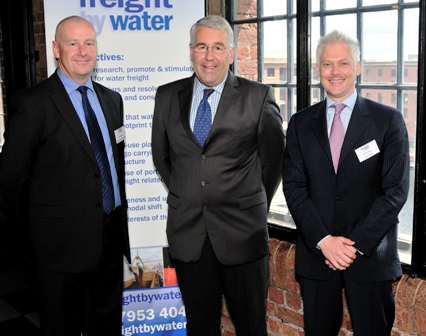
A wind of change is blowing within the freight industry. According to a series of high profile speakers at the second Modal Shift Forum, held at the Merseyside Maritime Museum last week, the uncompromising message from the new government is that road transportation is not reducing quickly enough to meet carbon targets; the clear commitment is to drive forward modal shift with a new energy and focus.
The forum, part of an ambitious project led by Freight by Water to promote radical re-thinking of supply chains to embrace cost-effective, sustainable multi-modal solutions, focused specifically on the opportunities offered by the Port of Liverpool and the Manchester Ship Canal; but it also provided a platform to consider the challenges faced by the wider industry.
Nick Gazzard, Chairman of the CILT Sustainable Distribution Forum, highlighted multi-modal collaboration as the most effective solution to meet government targets for carbon reduction. Whilst studies had shown sharing loads could lower carbon emissions by 12% and integrated networks could further reduce emissions by 18%, an early stage model for supply chain networks, developed by Freight by Water and CILT, demonstrated that multi modal collaboration could deliver not only substantial cost savings but reduced emissions of up to 30% - coincidentally the EU target for carbon reduction. "The challenge for the industry is to restructure," he said. "There is a big change in language from the new government; it is much more directive. They are looking for a re-engineered sustainable transport system. To date, the industry has made little or no progress on this, and if we don't do so within the two year deadline, we will be facing new legislation introducing tax on carbon emissions."
Nick was among several speakers who urged different sectors of the industry to cooperate in developing a multi-modal approach, rather than, as in the past, competing modes operating in separate silos of road, rail and water.
Andy Rickard, Operations Director of the UK's newest temperature controlled fresh produce facility, Liverpool Produce Terminal (LPT), shared impressive results of a multi modal trial project, where MacAndrews used short sea and rail to import one million cases of fresh produce from Iberia into the North West, via the LPT. The trial proved conclusively to be very reliable, safe and environmentally positive - delivering less noise, congestion and pollution. Vitally, Andy said, cost savings were substantial, both on inward shipping and outbound distribution, amounting to over £500k. In addition, carbon savings delivered amounted to 55.4kgs on 76 loads.
Mark Butchard of Mersey Partnership said that the £200m Liverpool Superport development, particularly the Post Panamax facility by Peel Holdings and Stobart's multi modal 3MG site , would substantially increase water based transportation and was a flagship project creating a new gateway for the North West.
Stephen Carr, Head of Business Development at Peel Ports Liverpool added that the development of a series of new multi modal destination ports along the 44 miles of Manchester Ship Canal supported a drive towards port centric distribution. "Our commitment is to unlock the value of the Manchester Ship Canal, developing truly multi modal port infrastructure along its length, giving access to significant multi modal links and driving change." Alluding to the successful Tesco wine barge trials, Stephen highlighted the commercial benefits of multi modal distribution, "If customers understand where water based transportation delivers value, that's when modal shift can happen," he said.
David Pendleton, Business Director of Mersey Maritime agreed, "The challenge we face as an industry is a mind-set change, not a capital investment issue," he said. David identified a 'disconnect' within major customers' internal logistics teams, where shipping and inland transportation were planned and costed separately. "This is an important issue, 40% of total supply chain cost is in the last 2% travelled; the potential additional costs of using ports other than Southampton and Felixstowe are more than mitigated by the savings on second leg road transport."
Steve O'Connor, Managing Director of Stobart Ports argued that trucks will continue to be essential for the last mile, but pointed out that the new 3MG facility represented 'multi modal at work'. "Road transport is part of the solution," he said. "It's not just about mode as far as our customers are concerned, it's about following the freight and keeping costs down. Our job as industry specialists is to develop smart, reliable, fast supply chains and make sure that the infrastructure is in place to make it easy for retailers when the recovery comes."
Executive Director of Freight by Water Peter Ward concluded that the freight industry was finally understanding that profitability and sustainability were not mutually exclusive, in fact were inextricably linked. "The future is about making intermodality connections on an end-to-end basis, finding the shortest final mile and identifying the most effective modes in between," he said. "We must move away from the legacy practices of the past as we move out of recession, bringing costs for customers down, whilst fulfilling green potential."
Describing the Modal Shift project as 'the start of a journey', Peter said demand would drive development of multi modal services and called for all stakeholders in the industry to come together to drive through change.